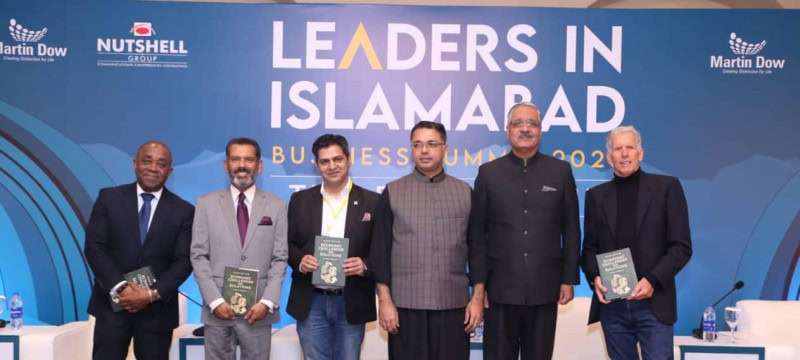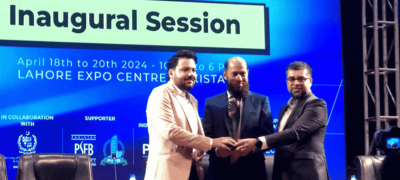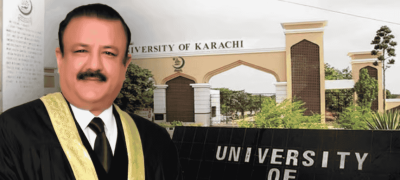The sixth edition of the LEADERS IN ISLAMABAD BUSINESS SUMMIT, with this year’s theme being “The BIG Rethink,” was concluded by Nutshell Conferences Group and Martin Dow Group in strategic partnership with Overseas Investors Chamber of Commerce and Industry (OICCI) and Unity Foods Limited. The second day of the Summit featured 4 sessions, 11 presentations, 2 chats, and 2 panel discussions on a variety of subjects, including the digital future, the state of education, narrative shaping, and climate change.
Federal Minister for Climate Change Senator Sherry Rehman spoke on becoming green for safety and survival. Since Pakistan recently ratified the Paris plastic pact, I would like to ask that at least the larger hotels stop using plastic water bottles. Pakistan generates enough plastic waste each year to cover two K2 mountains in weight. In an interview with Mosharraf Zaidi, the founder of Tabadlab, Senator Sherry Rehman pushed the local pollution agenda just as hard as the global one and claimed that Pakistan’s potential to adapt to meet the Sustainable Development Goals (SDGs) of the United Nations is in doubt.
Pakistan is a frontline state for climate change despite having low emissions. She saw corporate CSR as being too constrained to have the desired impact. She emphasised that new thinking is required and that more work needs to be done for inclusivity. She asked media outlets to quit politicising climate change and allow for adequate discussion space. The Joint Chiefs of Staff Committee’s Chairman, Gen. Zubair Mahmood Hayat, N.I. (Retd), spoke about the importance of narratives and posed important issues about how Pakistanis should create a story for a brighter future as a nation.
Nelson Mandela, Martin Luther King, and our Holy Prophet PBUH all made significant changes to society. We must reflect carefully on our political, social, and economic facets. Instead of taking incremental steps, we need to step outside of our comfort zones and tackle greater topics. We need to implement our plans as planned and take control of our political, societal, and personal narratives.
The discussion on “Imagineering – The Future of Education” was interesting. Former Federal Minister for Education and eminent educationalist Shafqat Mahmood joined online. Puruesh Chaudhary, the founder and president of AGAHI, and Dr. Amjad Waheed, the chief executive officer of NBP Funds, also provided their perspectives on the rapidly changing nature of higher education and the pressing need to shift the focus to students. Shafqat Mahmood emphasised the need for government intervention, saying that “focus on both skill-based education and a unified national curriculum are important to reduce the divide between the haves and the have-nots, secure the future of this country by ensuring social mobility for all.” Dr. Amjad Waheed provided startling data regarding children who are not in school: “Of the 53 million youngsters, 23 million are not in school. With a lack of teachers and money, brick-and-mortar schools are not the answer.
In order to effectively summarise the topic, Mosharraf Zaidi said that education must be the subject of ongoing discussion rather than being addressed only once during the two-day summit. Six distinguished speakers, including Muhammad Salman Anjum, founder and CEO of InvoiceMate in the UAE, Jouni Keranen, executive chairman of Kuuhubb and partner at swissOne Capital, Oscar Ramos, general partner at SOSV, managing director at Orbit Startups, Jimmy Nguyen, CEO of Blockchain for All, and Michael Foley, regional director at Airtel Africa, delivered individual addresses at the “The Digital Future – Emerging Issues” conference.
The subjects included collaboration and leadership paradigms, as well as the metaverse and blockchain. In his remarks, Zouhair Khaliq, the founder and general partner of Teamup Ventures, summarised the lessons learned during the session. Michael Foley spoke extensively about Pakistan’s enormous untapped potential and stressed the importance of thoroughly exploring the Metaverse. Users can immerse themselves in the metaverse and achieve glory there. The interaction and exchange of ideas among people demonstrates the current tendencies in the growing markets.
In order for SMEs to perform transactions easily, Muhammad Salman Anjum emphasised the need to increase confidence between banks, investors, and SMEs. “We utilise blockchain and artificial intelligence not just because they’re trendy, but also because they guarantee process efficiency and fraud detection that works. We will be acting in the capacity of an aggregator with InvoiceMate and focusing on due diligence to guarantee a smooth transaction between banks and businesses. “The BIG Rethink means celebrating failures,” said Jouni Keranen. “People miss out on successes when they refuse to take risks because they keep limiting themselves.”
Oscar Ramos acknowledged the value of transformation and asserted that it cannot take place in a vacuum. “Transformation affects every element. The integrated finance has an impact on the health and education sectors, which are crucial for everyone. Jimmy Nguyen provided numerous examples of how nations had learned from disruption and urged people to discover new ways to learn. If we take a look at Vietnam, e-learning started there about 2006 or 2007, but it really took off during and as a result of COVID-19, and as of right now, there are more than 100 Ed-tech start-ups there.
His hope was echoed by Zouhair Khaliq. “Pakistan is home to many hardworking individuals, thus it is encouraging to see start-ups taking part in the rethink. The source of growth in Pakistan is not academia or think tanks, but rather the start-up businesses, which are mushrooming up everywhere. Another sub-theme, “Imagineering the Future,” saw an array of specialists addressing the audience, including Dr. Rehan Al Taji, Founder & CEO, PXDX FZ LLC, UAE and Partner & Head of Projects, Gabriel Jobs, KSA; Kabeer Naqvi, President & CEO, U Microfinance Bank Limited; Ghazanfar Azzam, President & CEO, Mobilink Microfinance Bank Limited; Abdul Haseeb, Managing Director, TMC; and Farhan Hassan, Head of Easypaisa Wallet Business. Usman Yousuf, Director at Nutshell Communications, Chairman at ProPakistani, Co-founder at K-Cap Ventures, and CEO at Interactive UAE, moderated the discussion.
The panellists all agreed that Pakistan needs to become more financially inclusive and that dogmatic beliefs on traditional procedures need to change. According to Kabeer Naqvi, achieving financial inclusion requires social inclusion.
“There have been instances where women have received less in loans than their male counterparts, and I have stepped in to address this problem.” In order to promote an innovation culture, Dr. Rehan Ali Taji believed that governments needed to make it easier for start-ups. “If we don’t adopt new technology, we’ll fall behind, therefore we need to spread the word and advocate for it. Saudi Arabia has provided tax exemptions to support emerging tech companies and open doors for investors to advance innovation. Ghazanfar Azzam named education, healthcare, and financial access as the three elements that determine a society’s level of development.
The areas on which we need to concentrate right now are on giving our customers access to credit facilities; they should have a variety of options to choose from and should be able to do so comfortably from their homes and places of business. The architecture of Fintech apps were clarified by Farhan Hassan, who also stated that a variety of elements influence success.
In essence, no Fintech app can function alone. We are required to work together with other institutions in order to make our services available to end users and promote financial inclusion. According to Abdul Haseeb, Pakistanis must make a concerted effort to develop potential. “Corporate organisations must provide opportunities for young people, and young people must also profit from a variety of software that doesn’t necessarily require a cutting-edge setup to earn for themselves.” Derek Hoogenkamp stressed that Pakistanis understand the abundance of resources they have inherited and how each has the potential to succeed as a successful enterprise on both real-world and online platforms.The North of Pakistan has enormous tourism potential, and people need to take it seriously.
Mark Linder discussed TAKT, an assembly line formula that aided in the construction of industrial behemoths like Toyota. Pakistan is ready for cooperative solutions that can speed up progress while cutting costs. Air Chief Marshal Sohail Aman (Rtd. ), Pakistan’s Chief of Air Staff (2015–2018), gave the vote of thanks. He expressed gratitude to the audience, sponsors, presenters, and visitors for their enthusiastic participation on both Summit days.
“Pakistan’s potential is not in doubt; what is in doubt is people’s willingness to change. We all need to be aware of the dangers posed by climate change and grasp how effectively technology may not only help us fend off the crisis but also broaden our economic influence. It’s time to reconsider, he added.
More than 50 speakers from domestic and international organisations representing a range of industries attended LIIBS 2023. The biggest and most popular corporate event in the nation is this Summit.
The dates for the 7th Edition of the LEADERS IN ISLAMABAD BUSINESS SUMMIT were revealed by Muhammad Azfar Ahsan, Founder & CEO, Nutshell Group, at the conclusion of the Summit as 6 and 7.









